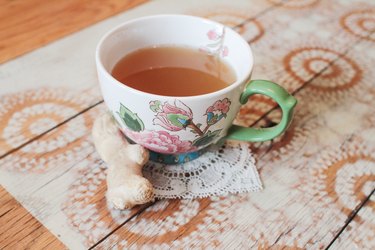
Ginger, the chunky root of a flowering plant used to make ground ginger tea, figures prominently in Asian and Middle Eastern cuisine. When made into tea, ginger can serve as an effective temporary remedy for nausea. You can also buy ground ginger for tea at any supermarket.
Tip
To make tea quickly from fresh ginger, scrape the skin off a piece of the root and grate it with a zester. Place the grated ginger in a cup or pot and pour boiling water over it. Let this steep for 10 to 15 minutes. Then add sweetener and fruit juice, such as pineapple or lime, and serve it hot or chilled.
Video of the Day
Making Ground Ginger Tea
You can shop for fresh, finely-ground imported varieties that give the ginger powder tea a picante quality at health food and gourmet supermarkets. You can also grate the ginger right at home and include extra ingredients that flavor the beverage to your palate.
Video of the Day
What you will need:
- Ground ginger
- Kettle or pot
- Mug
- Teapot
- Strainer
Step 1: Boil water in a kettle or pot.
Step 2: Grate fresh ginger from the root with a zester, if you didn't buy ginger powder from the store.
Step 3: Place about half a spoonful of ground ginger in a mug. You could also add a heaping spoonful or two of ground ginger to the pot or kettle of water. Stir the ginger tea and cover the mug with a small plate or the pot with a lid.
Step 4: Let the tea steep for around 10 to 15 minutes. The ground ginger settles to the bottom of the beverage.
Step 5: Place a strainer over a ceramic or glass teapot and pour in the ginger tea, if you made the beverage in a pot. You may wish to add a squeeze of lemon juice and sweetener to taste before serving the tea. You can drink the ginger tea you made in the mug straight out of the cup or strain the mixture into another cup to avoid the ginger sediment.
Optional Step 6: Add ice if you prefer to drink cold tea.
Benefits of Ginger Paste Tea
Ginger has been used for thousands of years throughout the world because of its powerful health benefits, especially for gastrointestinal and heart issues. Such health benefits include the following:
- Lowering nausea. In a March 2014 systematic review in Nutrition Journal on the effect and safety in the treatment of pregnancy-associated nausea, researchers found that ginger significantly improved the symptoms of nausea compared to a placebo in almost 1,300 pregnant people.
- Good for the heart and cardiovascular system. In an October 2015 perspective in Botanics: Targets and Therapy, researchers found that ginger lowered blood pressure and cholesterol due to its chemical composition.
- Helps gastroenteritis. In patients with gastrointestinal issues, researchers found that ginger was as effective at decreasing stomach pain as a nonsteroid anti-inflammatory drug (NSAID), and it is safer to use, according to a January 2019 study in Food Science & Nutrition.
- Relieves chemotherapy nausea. In the same Food Science & Nutrition study, the authors found that ginger supplementation can help people with cancer experiencing severe chemotherapy-induced nausea and vomiting.
- Nutrition Journal: "A Systematic Review and Meta-Analysis of the Effect and Safety of Ginger in the Treatment of Pregnancy-Associated Nausea and Vomiting"
- Botanics: Targets and Therapy: "Recent Perspectives on the Medicinal Potential of Ginger"
- Food Science & Nutrition: "Ginger in Gastrointestinal Disorders: A Systematic Review of Clinical Trials"